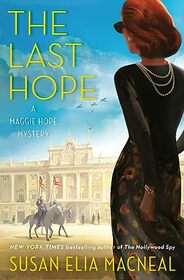It's always sad to see a favorite series end, but-- to be honest-- Susan Elia MacNeal's excellent Maggie Hope series had no choice. People in Maggie's line of work had notoriously short shelf lives. With everything she was being asked to do, her number was going to be up sooner rather than later. And what better way for her career to end than in this pedal-to-the-medal thrill ride, The Last Hope?
I have enjoyed every second of Maggie's service in World War II. She's grown from a bright yet naive young woman to a brave, resourceful agent for British Intelligence. In The Last Hope, Maggie finds herself in a moral dilemma facing betrayal and personal danger, and every step she took felt right to this reader.
As usual with one of MacNeal's books, I felt right at home in the setting and time period, aided a great deal by the little details that the author added to the story. I'd often wondered how Londoners navigated bombed-out streets during the blackouts, and MacNeal mentions the "curbs painted phosphorescent white to glow in the dark." In addition, you simply have to have a bon-mot by the incomparable Winston Churchill. Once again, the man made me laugh when he said that the British "ambassador was descended from a long line of maiden aunts." I also enjoyed seeing Madrid in wartime. Maggie found it quite a change to be in a neutral country, and so did I.
In The Last Hope, a character asks Maggie, "Will I ever read about you?" to which Maggie replies, "Not if I do my job well." One of the things I am most grateful to Susan Elia MacNeal for is bringing to light just what so many incredibly brave women did in service to their country during World War II. Thank you, Susan. You took splendid care of Maggie, and I look forward to your new stories.
(Review copy courtesy of the publisher and Net Galley)
I have enjoyed every second of Maggie's service in World War II. She's grown from a bright yet naive young woman to a brave, resourceful agent for British Intelligence. In The Last Hope, Maggie finds herself in a moral dilemma facing betrayal and personal danger, and every step she took felt right to this reader.
As usual with one of MacNeal's books, I felt right at home in the setting and time period, aided a great deal by the little details that the author added to the story. I'd often wondered how Londoners navigated bombed-out streets during the blackouts, and MacNeal mentions the "curbs painted phosphorescent white to glow in the dark." In addition, you simply have to have a bon-mot by the incomparable Winston Churchill. Once again, the man made me laugh when he said that the British "ambassador was descended from a long line of maiden aunts." I also enjoyed seeing Madrid in wartime. Maggie found it quite a change to be in a neutral country, and so did I.
In The Last Hope, a character asks Maggie, "Will I ever read about you?" to which Maggie replies, "Not if I do my job well." One of the things I am most grateful to Susan Elia MacNeal for is bringing to light just what so many incredibly brave women did in service to their country during World War II. Thank you, Susan. You took splendid care of Maggie, and I look forward to your new stories.
(Review copy courtesy of the publisher and Net Galley)




